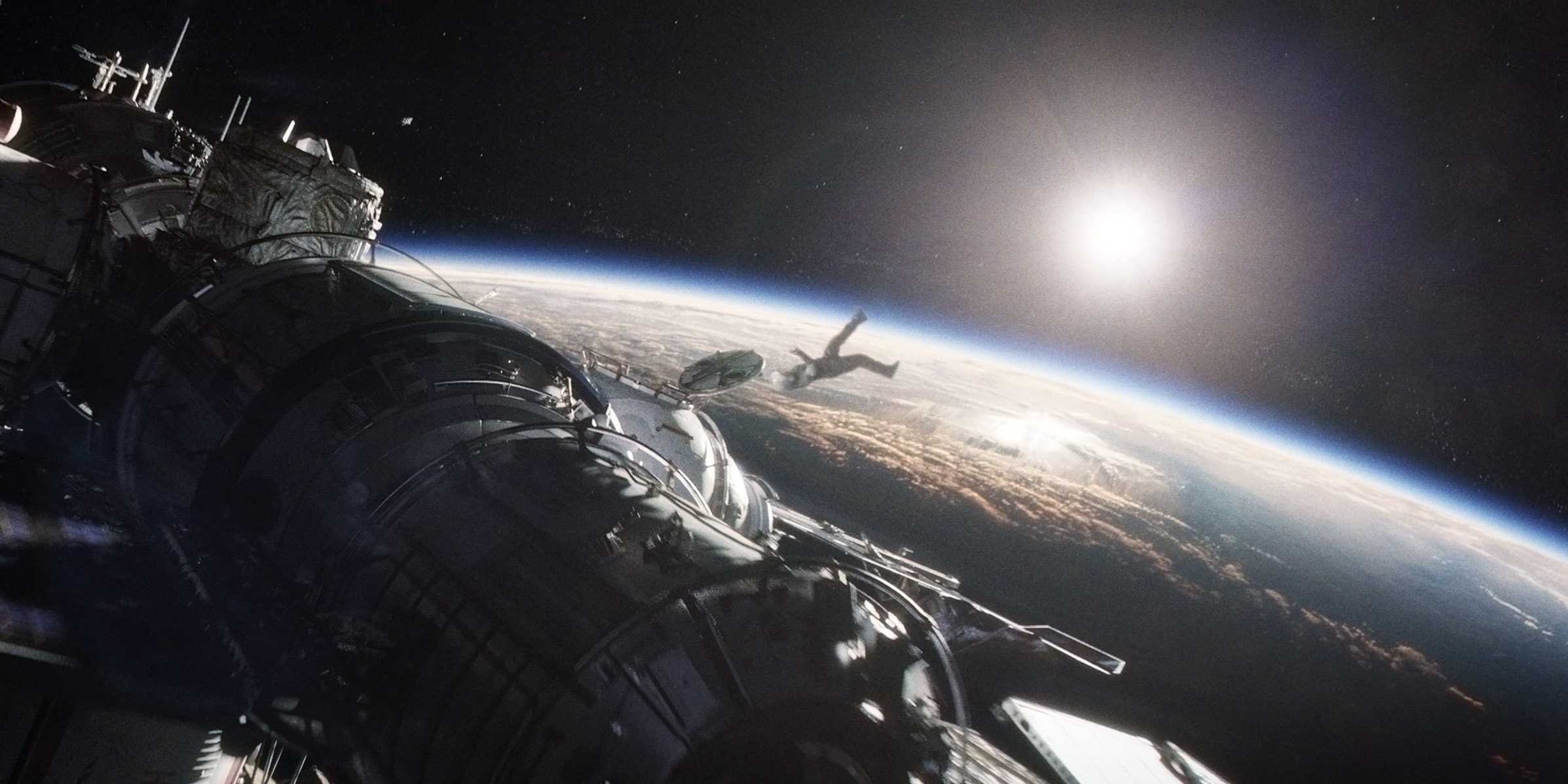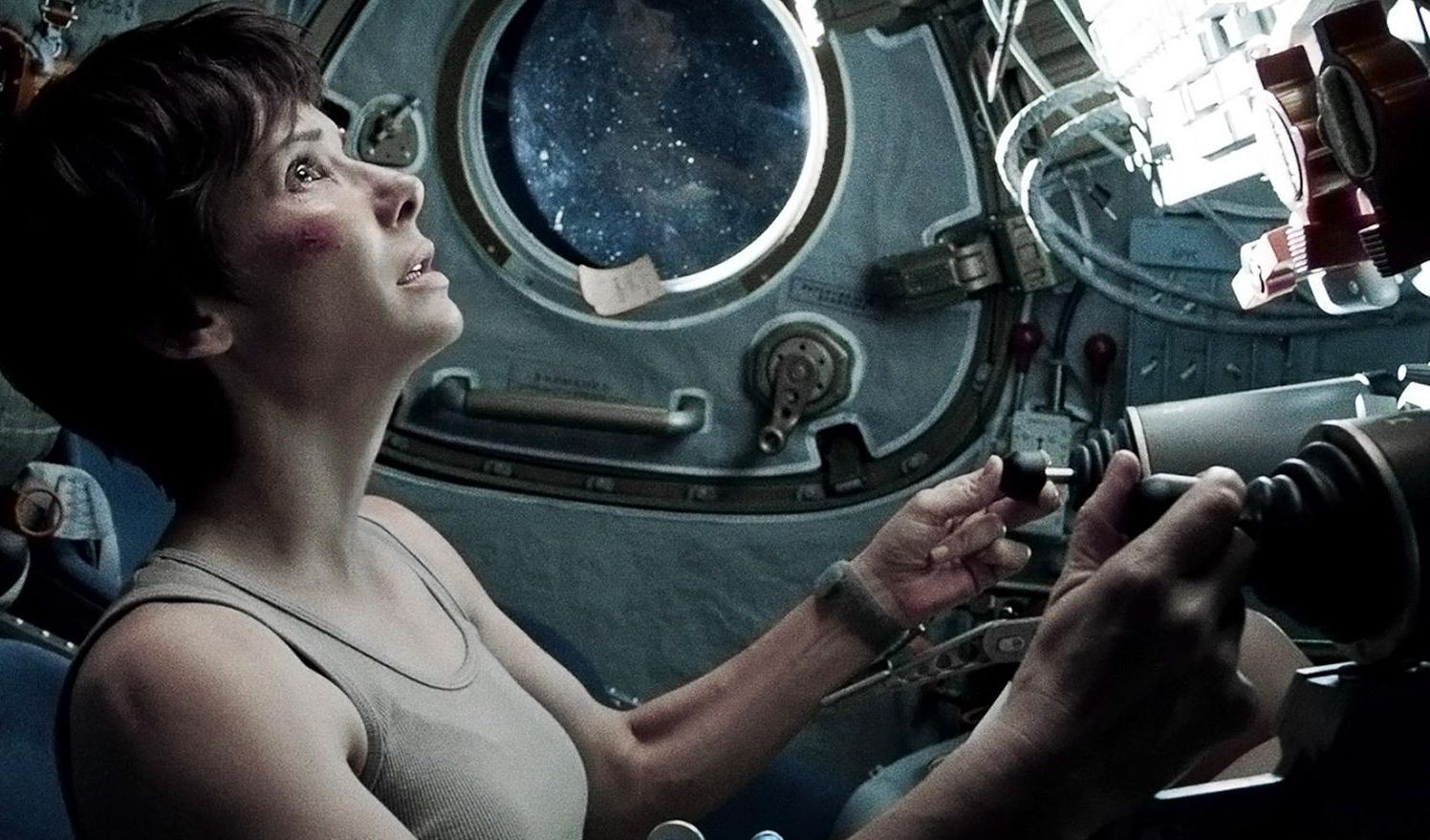 ★★★½
★★★½
“A coherent plot. It’s vastly over-rated…”
How you react to a film isn’t always a logical exercise. I’m a great proponent of “guilty pleasure” films: movies that, by objective standards, are generally not very good, yet still manage to be, on one level or another, thoroughly entertaining. Barb Wire is one: as soon as you realize it’s a post-apocalyptic sci-fi version of Casablanca, it’s totally awesome. Add this Indonesian movie to the same pile: it contains many things which, on their own, I loathe; yet here, for whatever reason, the whole ends up being a great deal more entertaining that you’d expect from the sum of its woeful parts.
Let’s start with that plot. Which is certainly a great deal more than the film does. Seriously: it takes 50 minutes for anything approaching a meaningful plot element to show up. It opens with a man driving home, being ambushed and stabbed to death. His wife and young daughter find him. Fast-forward ten years, and some thugs attack the house with what may be the longest single burst of automatic weaponry in cinema history, followed up, for no particular reason, by two rounds from a rocket launcher. Cue mother Sarah (Diyose) and pouty teenage daughter Marsya (Camesi) going on the run: Mom has clearly been anticipating this for a while, and has a hideout, stash of weapons and martial arts training. Turns out, there are two factions at play here: the one seeking to kill the family is led by corrupt cop Captain Roy (Fernandez), while playing defense is Paquita (Carter, best known for her role in Falling Skies), who… Well, you will find out eventually. Just don’t hold your breath.
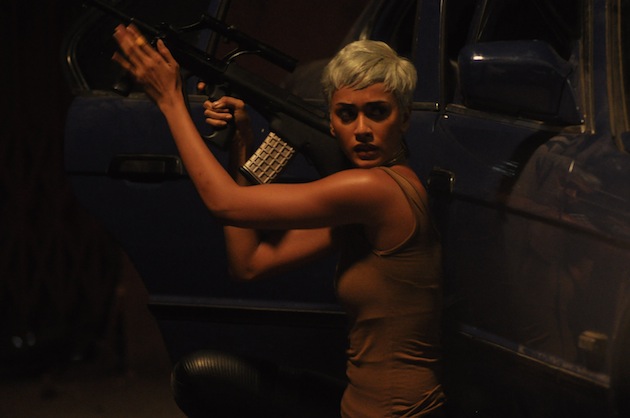 For before you reach that point, there follows alternating scenes of ludicrous excessive gun-battles, and Marsya whining “What’s going on? Make it stop? I said, WHAT’S GOING ON? I want an ice-cream!” [I may have imagined the last, I’m not sure] Normally, this kind of thing would be incredibly grating. But let’s face it, she’s basically echoing what the audience is thinking, so it’s okay. Throw in Kardit’s style of action, which consists of jerking the camera back and forth while simultaneously zooming in and out, and you’ve got the recipe for a headache-inducing exercise, about as far from fellow Indonesian flick The Raid as possible [seriously, if you haven’t seen The Raid, go do so now. It’s the best action movie of the past decade. You can thank me later.].
For before you reach that point, there follows alternating scenes of ludicrous excessive gun-battles, and Marsya whining “What’s going on? Make it stop? I said, WHAT’S GOING ON? I want an ice-cream!” [I may have imagined the last, I’m not sure] Normally, this kind of thing would be incredibly grating. But let’s face it, she’s basically echoing what the audience is thinking, so it’s okay. Throw in Kardit’s style of action, which consists of jerking the camera back and forth while simultaneously zooming in and out, and you’ve got the recipe for a headache-inducing exercise, about as far from fellow Indonesian flick The Raid as possible [seriously, if you haven’t seen The Raid, go do so now. It’s the best action movie of the past decade. You can thank me later.].
And yet… If you can handle the fact that the ratio of bullets to reloading scenes is several hundred to one, cope with not knowing what the hell is going on for half the movie, and tolerate characters that are basically a procession of shallow genre tropes, you’ll have fun. Against the odds, I did: there’s at least four women here with no qualms about kicking ass in industrial quantities, and both Divose and Carter bring the necessary intensity to their roles [there’s one awesome shot where Paquita is chasing after a car on foot and is just screaming at it]. There’s a chunk at the end where all three leading ladies are simultaneously fighting for their lives, and that’s a good deal more progressive than you’d get to see in most Western films. For all its many, copious flaws, I was kept entertained – as much by the daft insanity on view, as in spite of it. In the right hands, this could have been awesome: Kardit clearly is not those hands, yet it’s still more fun than I expected.
Dir: Helfi Kardit
Star: Dominique Diyose, Belinda Camesi, Sarah Carter, Nino Fernandez





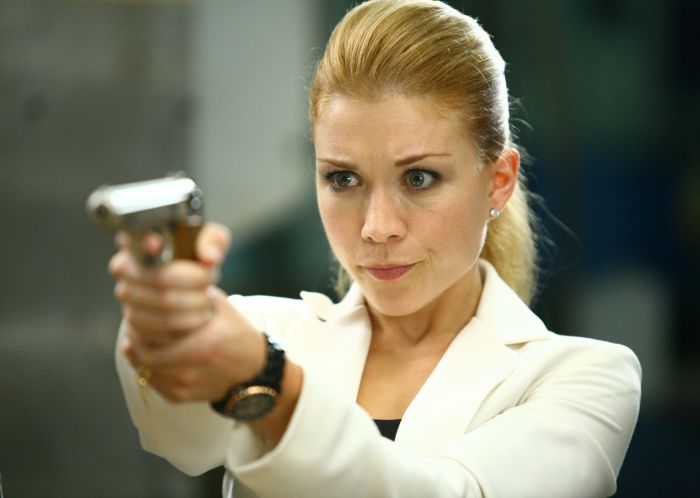


 And Frankenstein Created Woman? That might have been an alternate title, with German scientist Dr. Serafin (Jurgens) in the role of the creator – he’s a man with a dubious past, and whispers of involvement in Nazi experimentation. Now “rehabilitated” to the US, in what may be a medical version of Operation Paper Clip, he uses an unholy mix of pharmaceuticals and extreme training methods to convert his own daughter, Goldine, into a 6’2″ athletic superwoman, with the aim of completing an unheard of triple crown at the upcoming Moscow Olympics, winning the 100, 200 and 400 metre gold medals. To fund this work, he brings in a consortium of businessmen who aim to capitalize on Goldine’s success with advertising, merchandising, etc. Brought in to advise them, as Goldine is prepared for her first public events, is agent Jack Dryden (Coburn), who gradually realizes the one person not wholeheartedly committed to the entire proceedings, is the runner herself.
And Frankenstein Created Woman? That might have been an alternate title, with German scientist Dr. Serafin (Jurgens) in the role of the creator – he’s a man with a dubious past, and whispers of involvement in Nazi experimentation. Now “rehabilitated” to the US, in what may be a medical version of Operation Paper Clip, he uses an unholy mix of pharmaceuticals and extreme training methods to convert his own daughter, Goldine, into a 6’2″ athletic superwoman, with the aim of completing an unheard of triple crown at the upcoming Moscow Olympics, winning the 100, 200 and 400 metre gold medals. To fund this work, he brings in a consortium of businessmen who aim to capitalize on Goldine’s success with advertising, merchandising, etc. Brought in to advise them, as Goldine is prepared for her first public events, is agent Jack Dryden (Coburn), who gradually realizes the one person not wholeheartedly committed to the entire proceedings, is the runner herself.
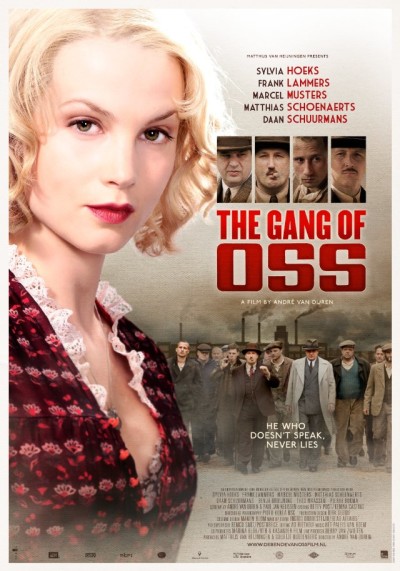 I never really think of the Dutch as the organized crime type, but this film convinces me otherwise, based as it is on actual events from just before World War II. Oss is a town in the Southern half of the Netherlands and, it appears, everyone there is on the take one way or another, from insurance scams to larger scale shenanigans, all the way up to the mayor and the local priest. The federal government has sent military police to the town to keep order, but that only rankles the locals, for the cops are Protestants and they are Catholics. Johanna (Hoeks) hopes to escape a life of crime, planning to open a restaurant when her husband, Ties (Schoenaerts), gets out of jail. But it’s not as easy as it seems. Her spouse is happy to pimp her out, and local boss and Ties’s uncle, Wim de Kuiper (Musters), drags him back into his old ways. When Ties tries to force Johanna to have an abortion, she hatches a plan to have him killed by her lover (and client), Jan, although the plan only puts her deeper in the clutches of de Kuiper. But when she discovers just how low he is prepared to go, she decides he and the rest of his cronies are going down.
I never really think of the Dutch as the organized crime type, but this film convinces me otherwise, based as it is on actual events from just before World War II. Oss is a town in the Southern half of the Netherlands and, it appears, everyone there is on the take one way or another, from insurance scams to larger scale shenanigans, all the way up to the mayor and the local priest. The federal government has sent military police to the town to keep order, but that only rankles the locals, for the cops are Protestants and they are Catholics. Johanna (Hoeks) hopes to escape a life of crime, planning to open a restaurant when her husband, Ties (Schoenaerts), gets out of jail. But it’s not as easy as it seems. Her spouse is happy to pimp her out, and local boss and Ties’s uncle, Wim de Kuiper (Musters), drags him back into his old ways. When Ties tries to force Johanna to have an abortion, she hatches a plan to have him killed by her lover (and client), Jan, although the plan only puts her deeper in the clutches of de Kuiper. But when she discovers just how low he is prepared to go, she decides he and the rest of his cronies are going down. The back-story behind how this was made is, in some ways, more interesting than the film itself. The star and co-writer was working as a stripper, and came up with the idea, almost as a coping mechanism to handle some of the creeps with whom she had to interact. Funding came from a customer at one of the clubs. But, unfortunately, it turned out that the money he was “investing” was actually being embezzled, leading to a two-year crawl through post-production – it still hasn’t received an official release in its American home. Made in 1997, it looks like a fossil from an earlier, much scuzzier era, with both its grimy New York locations and feel harking back to the work of Abel Ferrara.
The back-story behind how this was made is, in some ways, more interesting than the film itself. The star and co-writer was working as a stripper, and came up with the idea, almost as a coping mechanism to handle some of the creeps with whom she had to interact. Funding came from a customer at one of the clubs. But, unfortunately, it turned out that the money he was “investing” was actually being embezzled, leading to a two-year crawl through post-production – it still hasn’t received an official release in its American home. Made in 1997, it looks like a fossil from an earlier, much scuzzier era, with both its grimy New York locations and feel harking back to the work of Abel Ferrara.


 2013 was perhaps a landmark for women in action films. with the top slot at the American box-office going to Jennifer Lawrence in Catching Fire. But also present in the top five was this, which kicked Katniss’s arse for critical acclaim, snaring 10 Oscar nominations to Fire’s… Well, none at all, actually. That’s probably a little starker contrast than is accurate – they are respectively 97% and 90% Fresh at Rotten Tomatoes – but it is interesting to compare the two films and their approach. In Gravity, the sex of the lead character simply isn’t very relevant: you could switch it to being a man, and you wouldn’t need to change much, not even the name – Ryan Stone. I’d be unsurprised if told that, like Salt, this was originally written for a male lead. Indeed, it also fails the infamous Bechdel Test of feminism, passing none of its three criteria – though this says more about Bechdel’s uselessness than Gravity, I feel (Run Lola Run also goes 0-for-3, and it’s not the last thing it has in common, as we’ll see).
2013 was perhaps a landmark for women in action films. with the top slot at the American box-office going to Jennifer Lawrence in Catching Fire. But also present in the top five was this, which kicked Katniss’s arse for critical acclaim, snaring 10 Oscar nominations to Fire’s… Well, none at all, actually. That’s probably a little starker contrast than is accurate – they are respectively 97% and 90% Fresh at Rotten Tomatoes – but it is interesting to compare the two films and their approach. In Gravity, the sex of the lead character simply isn’t very relevant: you could switch it to being a man, and you wouldn’t need to change much, not even the name – Ryan Stone. I’d be unsurprised if told that, like Salt, this was originally written for a male lead. Indeed, it also fails the infamous Bechdel Test of feminism, passing none of its three criteria – though this says more about Bechdel’s uselessness than Gravity, I feel (Run Lola Run also goes 0-for-3, and it’s not the last thing it has in common, as we’ll see).